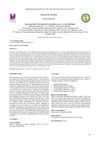TLDR Malatyadi tailam effectively improved hair fall, dryness, and thinness in a patient.
The document reports on a 19-year-old female patient with hair fall (Khalitya), dryness (kesha rukshata), and thinness of hair (kesha tanutva) who was treated with Malatyadi tailam, an Ayurvedic oil. The treatment showed significant improvement in the patient's hair fall, dryness, and thinness after regular application. The study suggests that Malatyadi tailam is effective in managing Khalitya by balancing the tridosha (Vata, Pitta, Kapha) and promoting hair follicle regeneration and healthy hair growth, offering a safe and cost-effective treatment option.
 September 2019 in “International journal of research in ayurveda and pharmacy”
September 2019 in “International journal of research in ayurveda and pharmacy” Ayurvedic treatment with Bhringraj Vati and coconut oil was safe and effective for reducing hair fall.
 67 citations
,
January 2013 in “Indian Journal of Dermatology, Venereology and Leprology”
67 citations
,
January 2013 in “Indian Journal of Dermatology, Venereology and Leprology” The document concludes that alopecia areata is an autoimmune disease without a definitive cure, but treatments like corticosteroids are commonly used.
 81 citations
,
June 2010 in “Journal of Dermatological Treatment”
81 citations
,
June 2010 in “Journal of Dermatological Treatment” The document concludes that minoxidil and finasteride are proven for hair growth, herbal remedies show promise, but more research is needed to confirm their effectiveness.
 30 citations
,
May 2018 in “Experimental Dermatology”
30 citations
,
May 2018 in “Experimental Dermatology” The conclusion is that future hair loss treatments should target the root causes of hair thinning, not just promote hair growth.

Taking care of your hair and managing hair loss requires a combined approach.
 7 citations
,
September 2004 in “대한의생명과학회지”
7 citations
,
September 2004 in “대한의생명과학회지” An extract made from Polygoni multiflori Radix, Angelica gigantis Radix, and Lycii Fructus was found to increase hair density and prevent hair loss in most users when applied daily for 18 months.
 370 citations
,
September 1999 in “The New England Journal of Medicine”
370 citations
,
September 1999 in “The New England Journal of Medicine” Finasteride and minoxidil are effective for hair loss, but continued research is needed for better treatments.







